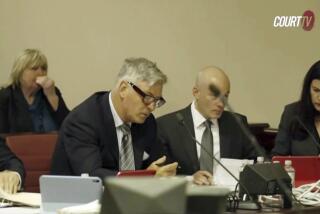What It Means When Jury Duty Calls
- Share via
The other night a comedian on TV was talking about juries: “If I get in trouble with the law,” she said, “I would never ask for a jury trial. I wouldn’t want my fate decided by 12 people who were not smart enough to get off jury duty.”
The joke was funny, but, fortunately for our judicial system, most people don’t feel that way--though the prospect of jury duty does cause problems for some when they receive their notice to report.
Every year the San Diego County judicial system mails about 85,000 of these notices to North County residents. If you receive one, and you have never been on jury duty, you may find yourself wondering: “Why me? Do I have to do it?” and, “What happens on jury duty anyway?”
Potential jurors are picked at random by a computer from lists compiled by the registrar of voters and the Department of Motor Vehicles, according to Gerry Stevens, San Diego County coordinator of jury services. The computer then assigns jurors to judicial districts according to where they live.
The county maintains two lists, one for the San Diego Judicial District, and one that encompasses all of the other county judicial districts. North County jurors could serve in either Vista or downtown San Diego.
There are many reasons for being excused from jury duty in the county judicial system; for example: poor health, taking care of an infant or invalid, lack of transportation, or living more than 25 miles from the courthouse; but the main one is economic hardship. “We can’t deprive people of their livelihood,” said Stevens.
In the county judicial system, jurors serve for two weeks or, if they are on a trial at the end of the two weeks, until the trial ends. For this they are paid $5 per day for each day they report and 15 cents per mile one way. However, according to Stevens, most businesses support the judicial system by paying the salaries of their employees called to jury duty.
If you are assigned to Vista, you will be in the care of Deputy Jury Commissioners Donna Walker and Sylvia Jones.
But, a word of caution: if you intend to get excused by inventing an excuse, don’t bother. Walker and Jones have heard them all, including: “I have to stay home to take care of my dogs”; “My dog chewed my dentures while I was on the phone”; “I’ve had a vasectomy.” (None of those were accepted.)
On entering the jurors’ lounge, you will see novices (often staring aimlessly at the walls or leafing through old magazines) and experienced jurors (often seeking bridge partners, or engrossed in books or crossword puzzles that they’ve brought.)
After a videotaped orientation, Walker and Jones divide the new arrivals into separate numbered groups. Since the number of jurors needed each day by the courts varies, after the first day, your group may be instructed to telephone each morning for recorded instructions to determine if you will be needed that day.
If your group is ordered to report to the courthouse, you will find that each of you has been further assigned to a color coded panel (yellow, blue, green, etc.) that simplifies assigning jurors to courtrooms.
Then you sit and wait, sometimes all day, in the jurors’ lounge--a large, nondescript room filled with a diverse collection of aging furniture to seat 150 people.
Because of the often long waiting periods, jury duty can be boring. But, occasionally, interesting things do happen.
Walker tells the story about two elderly women jurors who were sidetracked to serve as witnesses at the civil wedding of a young Marine about to be shipped to the Persian Gulf. And, sometimes, love connections are made in the jurors’ lounge. Jones talks about a man who attends her church. “He kids me that I’m responsible for his second marriage,” she said. “He fell in love with a lady he met here on jury duty who became his second wife.”
You may also get to meet some personalities. Among those recently selected to serve in Vista: baseball players Terry Kennedy and Craig Lefferts; retired movie actor, Steve Reeves (father of “Superman” actor Christopher Reeves); Channel 8 anchorman Stan Miller; and retired National League umpire John Kibler, who entertained the jury pool with stories from his 32-year career.
When they are notified that a courtroom is about to convene a jury trial, Walker or Jones will assign a panel by announcing over the loudspeaker, for example, “Yellow panel please report to Municipal Courtroom 2.”
At that point 30 to 40 people rise and file out of the juror’s lounge and go to their designated courtroom.
In the courtroom, after the clerk of the court administers an oath to your panel, the judge will give instructions and information about the upcoming trial.
Then the jury selection begins with the clerk of the court picking names at random from the group, and each juror called enters the jury box to answer questions from the attorneys associated with the case.
The attorneys and the judge then conduct the exercise of selecting some jurors and excusing others--without explanation and often for reasons not apparent to those being chosen or not chosen--until they have seated 12 jurors and two alternates.
If you’ve been seated, you’ll follow the trial through to completion--however long or short that period may be. If you’ve been passed over, you go back into the jury pool until the end of your two-week enlistment.
More to Read
Sign up for Essential California
The most important California stories and recommendations in your inbox every morning.
You may occasionally receive promotional content from the Los Angeles Times.













